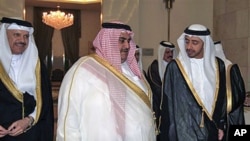As uprisings in the Middle East have spread in recent months, one key Persian Gulf country - Bahrain - has become the scene of demonstrations demanding greater political freedoms. But the situation in Bahrain is not entirely internal.
The Gulf Cooperation Council - a coalition of key Persian Gulf states - has weighed in on one side of the turmoil, with Iran speaking up on the other. The rhetoric has increasingly hardened, as both sides seek to influence what happens there.
Thousands of Bahrainis took to the streets starting in mid-February, demanding reforms to make the kingdom's Sunni-dominated government more representative, and its economy more inclusive, for the majority Shiite population.
Then, in mid-March, the Gulf Cooperation Council, led by Saudi Arabia, rolled a military force into Manama at the invitation of the ruling al-Khalifa family. Bahrain’s government said it was to ensure stability.
The Bahraini government and other Arab states quickly blamed Iran for the provocations that had triggered GCC assistance. Speaking in Washington on April 19, Bahraini Finance Minister Ahmed al-Khalifa called on Tehran to stop.
"In terms of Iran, you have seen their announcements," said al-Khalifa. "We feel that what happens in Bahrain is for the Bahraini people to reach consensus on, and to resolve. And, Iran is our neighbor, but we think that what has happened has to be resolved within Bahrain.
But Jean-Francois Seznec at Georgetown University discounts the Iranian influence. "The al-Khalifa family right now, [in Washington, as we speak] are distributing all manners of information saying that Iran was behind all of this [unrest]. And, this is a conspiracy [by Iran] that has been going on for 20-30 years. The fact is, in my own experience anyway, tells me that the Shi'a feel Bahraini - they don't feel Iranian. They don't really like Iran. The Shi'a in Bahrain are mostly Arabs. They're not Persian."
The GCC’s military move into Bahrain reverberated throughout - and polarized - the region. Arab countries, especially those in the GCC, praised the Saudi-led incursion. Iran strongly condemned it. At the Middle East Institute in Washington, Analyst Alex Vatanka said the GCC action reframed Iran's position.
"At the outset, when the unrest in Bahrain began, we actually witnessed, on the Iranian side in terms of rhetoric, [Iran] was very much attempting to portray what was going on in Bahrain, as [being] between the government - the al-Khalifa family - and the people," said Vatanka. "The people were not cast as Sunnis or Shi'a - they were just simply referred to as the people. All this changed overnight, as soon as we saw the 1,500 or so Saudi troops wander down the causeway [linking Saudi Arabia and Bahrain], followed by troops from the Emirates and Qatar later on. Suddenly, we saw the narrative coming from Tehran playing up the Shi'a identity of the Bahrainis."
Iran has traditionally seen both the Persian Gulf and the region’s Shiite population to be within its sphere of influence. It continues to express that attitude today as the region is in turmoil - according to former State Department official Graeme Bannerman.
"The Iranians see themselves as the dominant force, the natural dominant force in the [Persian] Gulf region," said Bannerman. "And, they will do all they can to assert their dominance in the region. It goes back to the beginning of the U.A.E. [United Arab Emirates], when they siezed the Greater and Lesser Tumbs, and Abu Mussa [islands.] Now, if you are sitting in Bahrain, with that precedent, you have to say 'That makes me nervous.' Whether that is legitimate or not, that makes them [the ruling al-Khalifa family] nervous."
The rhetoric has heated up. Recently, al-Arabiyah TV reported that Kuwaiti parliamentarian Muhammad Hayif had not only called on the GCC to liberate the Tumbs and Abu Mussa islands in the Gulf from Iran, but also had called for the break-away of Iran’s heavily Arab Khuzestan region. Vatanka said both sides have plenty to lose from such provocations.
"One day, they want dialogue. [The] next day, they want to go and, sort of, fund secessionist movements in one another's countries. Kuwait, Saudi Arabia, and a number of the other [GCC] states are also open to potential Iranian overtures to groups that operate in those countries that are, perhaps, looking for patronage [support]. Again, this is not going to be a situation where one country can said to be the winner, and others will be losing. This is going to be win-and-loss across the board for all of these states," said Vatanka.
The Eastern Province of Saudi Arabia, where much of that country’s oil production lies, is heavily Shiite. Riyadh worries that Iran, if provoked by secessionist efforts, may try to incite turmoil. And, Tehran knows that the Saudis would likely defend the Eastern Province.





